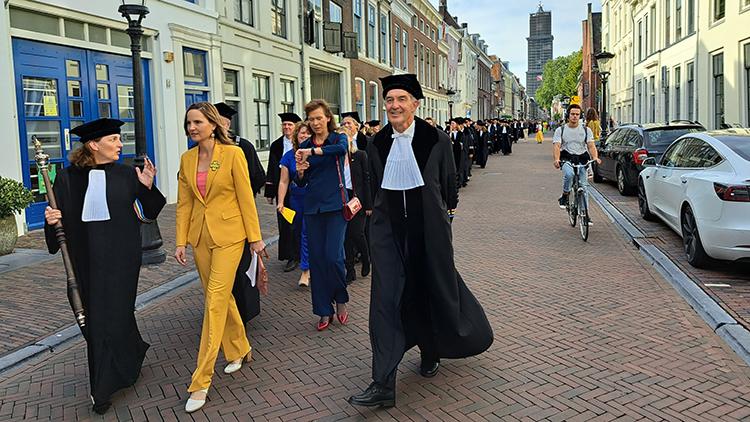No more distinction between support staff and academic staff
UU will now call all employees ‘university staff’

With this decision, the university board wants to break through the division of having supporting and administrative staff on the one hand, and scientific staff on the other. “We need more equality between scientists and the supporting staff,” President Anton Pijpers said in the Dom church. He says it’s a logical next step in the Recognising & Rewarding plans, in which teamwork is an important value. Because both groups play vital roles in what the university wants to achieve: providing academic education, and doing research.
The former name of scientific staff applied to everyone who works as a lecturer or researcher. They were seen as the pillars of the university’s ‘primary tasks’: research and education. Aside from that, there was the supporting and administrative staff, which meant all the employees who did not teach classes or do research. That group is incredibly broad and varied and includes everyone from security, IT staff, policy officers, faculty directors, and Executive Board members.
Removing the distinction between these two types of staff, then, is meant to create more equality within the already strongly hierarchical university. This hierarchy was clearly visible during the Start of the Academic Year, with a ceremony filled with traditions and symbolism, expressly emphasising the distinction between professors and the rest of the employees. The distinction was even visible in the Executive Board during the cortege (procession), as rector Henk Kummeling and president Anton Pijpers (who both once obtained the title of professor) wore togas, and third board member Margot van der Starre did not.
Symbolic gesture
It’s not entirely clear what consequences the name change will have, if any. It’s mainly a symbolic gesture, to increase the appreciation for supporting staff.
At the very least, it will not influence anyone’s salaries. The salary scales are fixed through the Universities of the Netherlands (UNL), with a system that goes up to scale 18 for each employee, and two separate scales for professors. That will remain the same.
One thing that will change within the university, is that it will no longer offer separate courses for scientific staff. That distinction was visible, for instance, in a leadership course, but it no longer matters whether you’re a leader of a team at a supporting service or a scientific team.
Recognition
It does mean that the well-known distinction between staff with core tasks (education or research) and the so-called overhead (supporting services) will disappear. The idea is that this will result in more recognition for the work of the supporting services, who also contribute to education and research. When he left the university in 2022, Leon van de Zande, general manager of the administrative staff, called for the distinction to be removed. “Especially during Covid, it became clear once again just how essential the employees of the supporting staff are. The IT department ensured that everyone could work from home almost immediately. The schedulers managed to create flexible schedules in difficult times, the security guards kept everything safe and secure, and the communication staff kept everyone informed.”
Moreover, more and more positions have been introduced that are technically categorised as supporting staff, but whose tasks fit in more with education or research – think, for instance, of research and educational assistants.
Overhead
Abolishing this distinction could have consequences for the codetermination councils. The current seat division reserves a number of seats for supporting staff. For Wim de Smidt, president of the University Council, the Executive Board’s decision is a reason to start a discussion within the council about a possible new setup of the seat division, which could include a division of members across different faculties. Reserving seats for supporting staff didn’t work well to begin with; these past few years, the number of University Council candidates from the supporting staff was lower than the number of reserved spots. Those seats were then taken by scientific staff instead.
Around ten years ago, the distinction between scientific and supporting staff was cause for discussion. The idea was that the group of employees who neither taught nor did research just kept growing. There were more and more managers, which, it was thought, meant less room for lecturers and researchers.
In Parliament, too, there were discussions to remove the overhead. Universities had to report each year how much scientific staff and how much supporting staff they had, and it was decided that the overhead was not allowed to surpass 20 percent of the total staff. These past few years, reporting was no longer required.